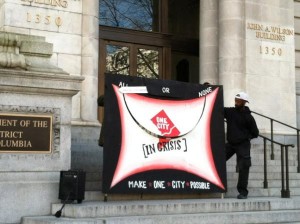Listen to budget director Eric Goulet and DCFPI director Ed Lazere
Audio clip: Adobe Flash Player (version 9 or above) is required to play this audio clip. Download the latest version here. You also need to have JavaScript enabled in your browser.
At a Ward 4 candidates forum Tuesday night, Councilmember Muriel Bowser said she’s proud of her 2011 vote to oppose raising taxes on the District’s highest income earners, and she pointed to last year’s budget surplus as proof that it wasn’t necessary. Bowser’s strong comments may have left audience members with the impression that D.C. presently has a budget surplus. It does not.
The city is facing a deficit of “about $170 [million] right now,” said Eric Goulet, Mayor Gray’s budget director. Comparing this year’s budget to last year’s, which resulted in deep cuts to social services, Goulet told TheFightBack, “In many ways it’s a much more difficult challenge.”
The budget’s impact on the most vulnerable received significant media scrutiny last year, but the poor seem to have been forgotten this time around. Maybe that’s to be expected when elected officials go around talking about surpluses at a time when the city faces major deficits, as well as poverty so severe it touches the lives of one in three children.
Monday on the steps of the John A. Wilson Building, D.C. Fair Budget Coalition (FBC) convened a One City In Crisis Summit in order to put a human face on the budget decisions city officials will be making.
“This is the week where the mayor’s got to make big decisions on what he’s going to do to balance the budget,” DC Fiscal Policy Institute director Ed Lazere told TheFightBack. “The question is, with the serious shortfall, will he raise revenues so that he can protect funding for things like healthcare and education and housing, or will he not? And if he has to make cuts, is he going to make the cuts so that everybody suffers? Or is he going to make cuts like he did last year in programs that largely effect our lowest income residents?”
Returning to the surplus Bowser discussed: well, it’s real and it’s significant ($240 million), but it’s from fiscal year 2011. Nevertheless, it could be used to stave off future cuts to services, which FBC is calling for, literally.
“I am calling today to ask the Mayor to prioritize safety net services in his budget,” reads the script FBC is providing supporters as part of its push to generate calls and emails to the mayor on Thursday. The script continues, “I urge the Mayor to close the budget gap by raising new revenue and by spending some of the $240 million surplus.”
In addition to a budgetary crisis, Mayor Gray is facing “a human crisis,” said Lazere. Problems such as poverty, homelessness and unemployment “can only be addressed with investments of public resources and we just hope that he makes a balanced decision.”
Related links:
makeonecitypossible.com
dcfpi.org

